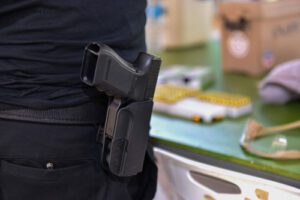 Judge Bumb continued: In weighing requests for injunctive relief post-Bruen, other courts have adopted the same conclusion and found similar Second Amendment deprivations to constitute irreparable injury. See, e.g., Spencer v. Nigrelli, 2022 WL 17985966, at *13 (W.D.N.Y. Dec. 29, 2022) (finding pastor’s inability to exercise right to carry firearm at place of worship to constitute irreparable harm) (citing A.H. by & through Hester v. French, 985 F.3d 165, 184 (2d Cir. 2021) (“The denial of a constitutional violation ordinarily warrants a finding of irreparable harm, even when the violation persists for ‘minimal periods’ of time.”)); Hardaway v. Nigrelli, 2022 WL 16646220, at *17 (W.D.N.Y. Nov. 3, 2022) (same); Antonyuk v. Bruen, 2022 WL 3999791, at *36 (N.D.N.Y. Aug. 31, 2022) (finding irreparable harm in challenge to New York’s Concealed Carry Improvement Act based on plaintiff’s “diminished safety in all the locations that he currently carries his concealed handgun that he will not be able to carry it”).
Judge Bumb continued: In weighing requests for injunctive relief post-Bruen, other courts have adopted the same conclusion and found similar Second Amendment deprivations to constitute irreparable injury. See, e.g., Spencer v. Nigrelli, 2022 WL 17985966, at *13 (W.D.N.Y. Dec. 29, 2022) (finding pastor’s inability to exercise right to carry firearm at place of worship to constitute irreparable harm) (citing A.H. by & through Hester v. French, 985 F.3d 165, 184 (2d Cir. 2021) (“The denial of a constitutional violation ordinarily warrants a finding of irreparable harm, even when the violation persists for ‘minimal periods’ of time.”)); Hardaway v. Nigrelli, 2022 WL 16646220, at *17 (W.D.N.Y. Nov. 3, 2022) (same); Antonyuk v. Bruen, 2022 WL 3999791, at *36 (N.D.N.Y. Aug. 31, 2022) (finding irreparable harm in challenge to New York’s Concealed Carry Improvement Act based on plaintiff’s “diminished safety in all the locations that he currently carries his concealed handgun that he will not be able to carry it”).
Here, Plaintiffs persuasively explain that the constitutional deprivation alleged constitutes an irreparable injury. [Pls.’ Br. at 12.] Plaintiffs have demonstrated that they have been immediately harmed by the enactment of the challenged provisions of Chapter 131. Before the law was passed, Plaintiffs were generally free to exercise their Second Amendment right to bear arms in public for self-defense by carrying a licensed firearm on their person, for instance, at a “library or museum,” “bar or restaurant where alcohol is served,” or “entertainment facility”; on “private property”; or in their vehicles or on public transportation.
Now, Plaintiffs all testify that they have ceased carrying their firearms because of the new restrictions. [See Koons Decl. ¶¶ 12, 13; Gaudio Decl. ¶ 15; Muller Decl. ¶ 18.] Citing Grace v. District of Columbia and Rhode, Plaintiffs suggest that the loss of psychic comfort that underlies being prohibited from carrying a licensed firearm for self-defense in public is a component of the irreparable injury that they experience. [Pls.’ Reply at 13.] The Court does not express a view on this point, in particular. The deprivation constitutes an irreparable injury simply because it so restricts Plaintiffs’ ability to exercise their right to self-defense in public as to render it a nullity, whatever their underlying sentiment for carrying a firearm for self-defense.
The end of the second-to-last paragraph provides a convenient list. It summarizes the areas where permits-to-carry once again apply. There can be no blanket prohibition against firearms in these areas unless the Defendant-State prevails in the underlying case(s).
